#and now there's a welsh biography post on him with more information which is great
Explore tagged Tumblr posts
Text

Illtud Evans was born John Alban Evans on the 16th of July, 1913. His parents, Catherine and David Spencer Evans, a postmaster, were Welsh-speaking Nonconformists.
Though born in Chelsea, he went to Towyn Grammar School then St David's College, Lampeter (now the Lampeter campus of University of Wales, Trinity Saint David). However, he was expelled in 1934 for homosexuality - for attempting 'to induce a fellow-student to commit an act of gross immorality.'
He became a journalist then converted to Roman Catholicism and became Dom Illtud Evans of the Dominican Order. He became editor of 'Blackfriars' and 'New Blackfriars' journals and wrote for newspapers and magazines like 'Time and Tide' (a feminist magazine started by Lady Rhondda, which became more political and Christian after her death - though it also had become more right-wing with her changing views).
In the 1960s, he moved to the US, living in New York and California and visited prisons and rehabilitation centers as a priest.
Illtud Evans died on the 22nd of July, 1972 in Athens, having left the US in 1970 after a stroke.
Following his death, his friend Cliff Tucker began a campaign for Illtud Evans' exoneration and posthumous graduation, along with his partner Tony Dyson. They were both gay rights campaigners, Cliff Tucker having also gone to Lampeter University, giving his name to their Cliff Tucker Theatre. Cliff Tucker was successful and Illtud Evans was awarded his degree posthumously.
Sources & Further Reading:
Ruth Gooding, (2024), 'Evans, Illtud (John Alban Evans) (1913-1972), Catholic Priest,' Dictionary of Welsh Biography, https://biography.wales/article/s14-EVAN-ILL-1913
Papers of Tony Dyson and Cliff Tucker https://archiveshub.jisc.ac.uk/search/archives/6aa178a1-4379-3933-877d-9beeb47de025
Dom Illtud Evans Papers https://archiveshub.jisc.ac.uk/search/archives/5f573f63-23e2-3791-a383-d7ca593bef68
https://www.library.manchester.ac.uk/rylands/special-collections/a-to-z/detail/?mms_id=992983876610801631
#illtud evans#history#lgbtq history#queer history#gay history#welsh history#wales#lampeter#welsh biography#had this in drafts for ages and am always confused when I can't find the post on him#because I didn't post it!#and now there's a welsh biography post on him with more information which is great#I would've written it if somebody else hadn't already!#which is cool I have others to write#want to post this in Welsh too but couldn't decide if in the same post or separate post#but not sure I have time
4 notes
·
View notes
Note
1, 5, 7 :)
Thanks for the ask! This is kinda a long one without any pretty pictures, so I’ve tagged it for anyone who doesn’t want it clogging up their dash.
1. Historical figure you used to like before you learned more about.
I’ve never actually liked him, but Winston Churchill. I knew he was 'problematic’ to an extent, but I was pretty neutral on him since, you know, he “saved Europe” from the Nazis. I also didn’t learn about him in school, so I just took the established opinion of him at face value. But MY GOD he was a racist, white supremacist, imperialist, genocidal piece of shit. Here are some choice quotes from the man himself:
On the Boer War (1902): “[It was] great fun galloping about.” “[My only] irritation [is] “that Kaffirs should be allowed to fire on white men” (The ‘great fun’ being the war in which the British sent 100,000+ black Africans to concentration camps, and ‘Kaffir’ being a racist term for black Africans.)
On the use of chemical weapons against the Kurds (1920): “I am strongly in favour of using poisoned gas against the uncivilised tribes … it would spread a lively terror.”
On Mussolini (1927): “In the conflict between Fascism and Bolshevism, there was no doubt where my sympathies and convictions lay.” (Hint: it was fascism.)
On Palestinians (1930s): “Barbaric hordes who ate little but camel dung.” On self-determination: “I do not agree that the dog in a manger has the final right to the manger.”
On Jewish people (1937): “It may be that, unwittingly, they are inviting persecution — that they have been partly responsible for the antagonism from which they suffer.” (Hitler was already in power, so YIKES)
On the genocide of Native Americans and Indigenous Australians (1937): “I do not admit, for instance, that a great wrong has been done to the Red Indians of America or the black people of Australia. I do not admit that a wrong has been done to these people by the fact that a stronger race, a higher-grade race, a more worldly wise race to put it that way, has come in and taken their place.”
On the partition of India (1947): “I’d rather see them have a good civil war.” “The Hindus were [a] race protected by their mere pullulation from the doom that is due” (’Pullulation’ meaning ‘to multiply rapidly’, and ‘the doom that is their due’ being the brutal, sectarian partition in which millions were killed and displaced. Churchill may have helped create Pakistan — or as he called it, Britain’s “bit of India” — but he despised Pakistanis, who he considered a “lower manifestation” of humanity.)
On the Bengal Famine which killed 3 million (1944): “I hate Indians. They are a beastly people with a beastly religion.” (Keep in mind that, like the Irish Famine, the Bengal Famine was a direct result of his own government exporting rice from India, despite the fact that crops had failed and that Churchill was repeatedly warned that continuing to export rice would lead to famine. Not only did Churchill deny relief to Bengal, but he also blamed the Bengalis for their own starvation for “breeding like rabbits.”)
His opposition to Nazism wasn’t nearly as principled as most people believe. Far from being an anti-fascist and anti-Nazi, Churchill was himself a fascist eugenicist, who only opposed the Nazis insofar as Hitler’s imperial ambitions threatened British dominance. This was the same Churchill who once boasted that the “Aryan stock is bound to triumph,” and whose main criticism of Hitler was that he had “not been mellowed by the great success that ha[d] attended him,” lamenting the loss of “the Hitler of peace and tolerance.” I was neutral on Churchill before, but now I’m pretty comfortable placing him in the same league as other racist mass murderers, if not in death toll, then certainly in his views. The British Viceroy of India said that “Churchill’s attitude towards India and the famine is negligent, hostile and contemptuous.” The Indian Secretary of State said that there wasn’t “much difference between his outlook and Hitler's.” His own secretary attested to him saying that Indians were “a foul race ... and he wished Bert Harris could send some of his surplus bombers to destroy them.” And those were just his view on Indians. While Churchill’s own colleagues saw him as an extremist, the cult of British exceptionalism demands that these inconvenient aspects of his legacy be ignored, lest they contradict the narrative of the Empire as an ultimately beneficial, civilising force.
Don’t get me wrong, I do think that Churchill is worthy of serious study, as all influential and complex figures are. But he is uncritically considered The Greatest Briton of All Time purely because of his whitewashed wartime legacy, which has been used time and time again to dismiss the very real harm he caused to millions of people and continues to cause harm today. Stalin also “saved Europe” from the Nazis, but it would be insulting to say his role in defeating Nazism somehow excuses his atrocities. Yet Churchill’s atrocities are constantly excused because his victims were mostly brown “savages” (his words), who needed to be ‘civilised’ anyway. You only have to look at this BBC article to see his apologists’ mental gymnastics in trying to defend him (here’s my favourite: “Although Churchill did think that white people were superior, that didn't mean he necessarily thought it was OK to treat non-white people in an inhumane way”). As a POC from a former American colony, I find the systematic erasure of the atrocities committed by the Anglosphere and the knee-jerk defensiveness towards any acknowledgement of the intergenerational trauma caused beyond irritating. The Cult of Churchill is but one example of this.
5. Historical figure we should talk more about.
JASPER TUDOR UNCLE OF THE CENTURY. Now that was a man who was actually loyal to his brothers and protected his nephews, unlike... some other uncles I could name lol. He’s also the one Tudor man (aside from Arthur) that PGregs couldn’t demonise, although she did still portray him as a 26 year old man being in hopelessly love with his 13 year old sister-in-law, which uh, NEVER HAPPENED.
Anyway, I have a whole tag devoted to Jasper here if you want to learn more about him. There are also three historical biographies dedicated to him: Jasper Tudor: Dynasty Maker by Terry Breverton (2014), Jasper Tudor: Godfather of the Tudor Dynasty by Debra Bayani (2015), and Jasper: The Tudor Kingmaker by Dr Sarah Elin Roberts (2015). I haven’t actually read them myself so I can’t give you my opinion on them, but I have read Wales and the Wars of the Roses by Howell T. Evans (1915) which discusses Jasper in detail and I highly recommend.
7. Favourite primary source.
Oh man, it’s so hard to choose! Purely in terms of aesthetics, it has to be Les Très Riches Heures du Duc de Berry. I even have a whole tag devoted to salivating over the pretty colours lol. In terms of textual information, I’d probably say Henry VII’s letter to his mama, Maggie B. It reveals so much about Henry’s relationship with his mother, including how close they were, how much he respected her, and how often they collaborated in matters of state. It also includes this cute line:
I shall be as glad to plese you as youre herte can desire hit, and I knowe welle that I am as much bounden so to doe as any creture lyvyng, for the grete and singular moderly love and affection that hit hath plesed you at all tymes to ber towards me.
I was supposed to write a post about it, but I got lazy so it’s still sitting in my drafts. In terms of both textual information and literature, I think Gwaith Lewys Glyn Cothi is pretty underrated as a primary source. They’re poems, so naturally there’s a lot of embellishment, but they give a lot of insight into the under-explored Welsh aspect of the Wars of the Roses from someone who actually lived through the era. I’m also Jasper Tudor trash, so of course I’d like anything that talks about him.
(The history asks meme is still open!)
#i will tag my hate actually#winston churchill#now for the people i don't hate#jasper tudor#henry vii#margaret beaufort#lewys glyn cothi#history ask meme#juliawickers#questions for the beard
21 notes
·
View notes
Text
The Strange Case and Origin of Dr. Edgar Griffith Swansea
“For we learn to do certain things before we know what we are doing and in ways that no one can adequately explain. In twenty-four months, an infant learns to recognize and discriminate the elements of the world around it, learns to pull itself erect and walk, learns to hear language and to talk. Is it possible that we accomplish these feats better for our lack of knowledge about how we do them? Can we know anything unwittingly? ...Will knowledge solve our problems? Will an ‘explosion’ of knowledge reduce hardship among us and make us just, virtuous, and free?” — Forbidden Knowledge: From Prometheus to Pornography: FOREWARD
Vampyr has a rather unique method of sharing the narrative of its characters a, in that we only learn the truth of who they are and what they are throughout all their lives only when you choose to Embrace them and witness their final moments. It is Gothic, melancholic, morbid, sinister, grotesque—like a foretelling omen. While Vampyr and DONTNOD have taken inspiration from many eras and many works, there were always certain characters within the game that I wondered much more curiously about than others. Edgar has been one of them; boggling in my head since the game’s release long back in June, and I just found myself researching into this bizarre, yet bubbly and warm man. I have much to share, and a lot I’ve found, but for now, I just wanted to share and analyze interesting details I have found about just where exactly Edgar came from, and how on Earth he landed himself in the so-called “vertiginous” world between life and death as the Administrator of Pembroke. As usual, feel free to PM/message me if you wish to discuss any of the work I post! I’d love to hear other people’s thoughts.
This essay is going to spoil everything and anything about Vampyr, so be warned! It will also spoil any other references I may mention in the process, but as always, those shall be marked!
@orionali, this essay was inspired by your dedication to Swansea as a character! I would also like to thank you for assisting me with this essay, as without your help and resources, I would have had a lot more trouble analyzing this essay.
I would also like to thank @terioncalling for their extensive resources and archiving of lore collectibles; its been a great help in assisting me with this essay and many of my other upcoming projects!
We cannot analyze Edgar without first attempting to dissect and review what we do know about who he is, where he came from, and how he even found himself as the Administrator of Pembroke in the first place. This essay will entirely be dedicated to analyzing the information we have about him from the game and connecting it to outside sources and time periods that occurred during the 20th century. This essay will also take the time to analyze some of the information garnered from these sources and will attempt to dissect exactly what they mean and why they were chosen as they were as a sort of biographical account of his origins.
To start off, we have Edgar’s entire biography to us if you choose to Embrace him during His pillar choice:
Full screenshot
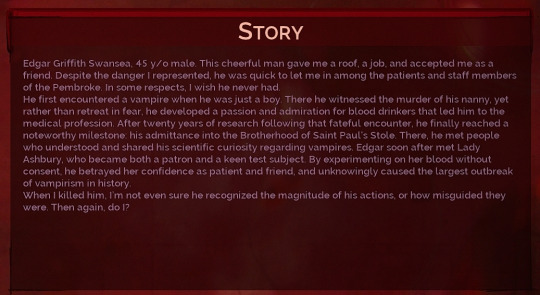
Alongside his personal history, we also have some hints as to what he did prior to his administration signing at Pembroke in 1911, which reveals that Ashbury had offered him the position in 1909.
Full screenshot
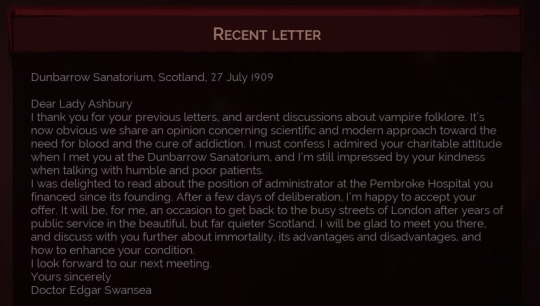
Here are Edgar’s personal accounts regarding his past and present when speaking to Jonathan, revealing that he has been engaging in experiments with haematology as well as vampiric blood, presumably.




Even prior to this, we know that Pembroke’s earliest record is on April 6th, 1872, just a year before Edgar’s birth as we can spot a photograph of Pembroke from that time.
Full screenshot
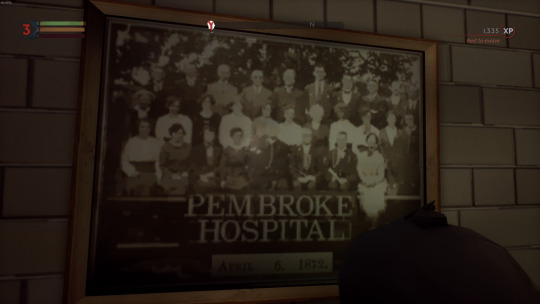
We also know where he may have received his medical education from, as a photo of the Royal College of Physicians is also hanging in his office:
Full screenshot

Along with that, he shares an old friendship with at least one of the staff members, Dr. Corcoran Tippets, and one could even say the current night staff at Pembroke were all hired by Edgar!
Full screenshot
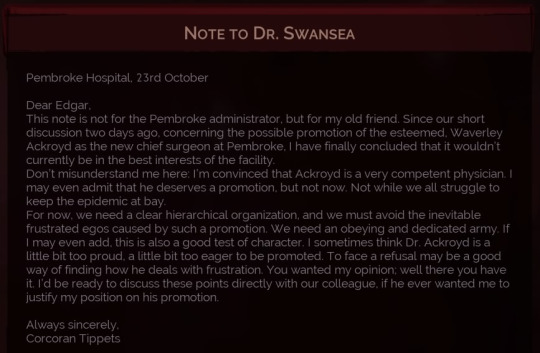
Armed with this knowledge, we can now begin to dissect him one by one, starting with his name and attempting to establish his place of origin. We are first told that he is 45 at the time of his death (Embrace), which means that Edgar was born in 1873 in the heart of the Victorian Era (1918 - 45 = 1873). We also receive his full name—Edgar Griffith Swansea, which is a curious choice of middle name as well as surname. The fact that he even has a middle name is also an interesting choice, as middle names were often only reserved for those in the elite ((the longer one’s name was, the more classically elite you were—take the ancient usage of the “praenomen, nomen, cognomen” system of the Romans, where a name was meant to indicate your branch or family tree; take Q. Pompeius Senecio Sosius Priscus’ full name, which boasted a total of thirty-eight (pg 303). Jonathan and Ashbury also share a similar phenomenon which is telling of the lineages they presumably stemmed from; especially for Ashbury, as women only held two names unless they hailed from a royal or extremely wealthy family)). The practice remained in the 20th and 19th century but was still rather rare as the custom itself decreased over time in Rome through the centuries, leaving the practice obscure and lost. The Italians brought back the tradition in the 13th and 14th centuries, either deciding between a common name or utilizing the name of saints so that their children may be protected by said saint.“Griffith” is a Welsh surname. Pronounced “ɡɹɪfɪθ”, it’s origins come from Wales, stemming the Anglicized version of Middle Welsh word name known as “Gruffudd”, which is also derivative of the Middle Welsh word “Gripiud”. The word only proceeds to find itself in older and older origins; to the Proto-Brythonic word “Grifjʉð”, which came from a language even further back to the Latin and Celtic words; “grȳphus” (griffin) and “jʉð” (judge), with “jʉð” stemming from the Proto-Celtic word “yowdos”, which stands for “lord” or “judge”. This makes sense, as when you define the closest word to “Griffith”, it references an interesting trend:
N. A male given name, borne by ancient kings of Wales. A patronymic surname.
“Patronymic” means a name that stems back from an older male ancestor, most often a father or some sort of King. This implicates that the name itself was only reserved for those in power. The “ancient king” in question was that of King Gruffydd ap Llywelyn, who ruled from c. 1039 to 1063. You can also consider some similarities with the “Griffin”, or “Gryphon” creature, as both words hold the same Latin origin as “Griffith” (grȳphus), but do note that they are not mutually exclusives. As for his surname, it also holds Welsh origins and is actually an entire region within Southern Wales. It was not named an official city until the year 1969, but a town charter had been established in Europe’s Middle Ages from 1158 - 1194. The etymological origins of the word are a mixture of Old Norse of the words “sveinn”, meaning “boy” or “servant” and “ey” meaning “island”. “Swansea” itself also held various variations from the 12th to 14th century, from “Sweynesse” in c. 1165, “Sueinesea” in 1190, and “Swanesey” in 1322. Digging deeper into the etymology leads us with further implications to servitude; “sveinn” holds roots in the Proto-Germanic word “swaniez”, goes further back into the Proto-Indo-European word “swé”—both of which connote to the definitions of:
N. *swainaz m. (masculine) relative; kinsman; young man herder; herdsman
“Swé” itself means to “separate; apart; one’s self; one’s own”, which is quite peculiar given how the words it would come to shape would mean that of servitude and obedience. Of course, being a Welsh city it also has a Welsh name, which is known as “Abertawe” a combination of the two words “aber”, lit. “estuary, mouth”, and “tawe”, a river that borders Swansea, but also has an obsolete definition which also proves to be curious:
Adj. to “taw out” or to “tawe out”; lit. “take out” through means of extorting.
Combined, it grants us the literal definition of “the mouth of Tawe”, hence “Abertawe”, which was first mentioned in a Welsh document Aper Tyui around c. 1150, as well as various other texts mentioning the phrase. But what of his forename, of our duly noted “Edgar” himself? “Edgar” hails from the Old English word “Ēadgār”, an amalgamation of the words “ēad” meaning “happiness, prosperity” and “gad”, meaning “spear”. “Ēad” is specifically used in a poetic context and definition, for instance:
N. (poetic) happiness, prosperity Geþyld byþ middes eades. “Patience is half of happiness.”
Much like “Griffith”, it, too, is a patronymic name as well as a given male name. “Ēadgār” was also the name of several kings from the Old English era, such as Ēadgār the Peaceful (or Edgar the I, or Edgar of England) who reigned from 959 to 975 and as his title would suggest, was most revered and known for his reign of peace; so much so, that his name has been connotative to “happy spear”, the “Ead” itself referencing several objects and symbols behind “happiness”, as shared in “The Old Norse contributions to the development of the English lexis – a study based upon Proto-Germanic”, which analyzes how the Old Norse language developed the current English and Welsh languages:
“It managed, however, to leave its trace in a few Anglo-Saxon names – some of them still common in modern times: Ēadgār ‘happy spear’, Ēadmund ‘happy protection’, Ēadred ‘happy counsel’, or Ēadweard ‘happy guardian’.” (pg. 45)
This assertion of incessant happiness being tied to his name is quite fitting for the bubbly, albeit eccentric and peculiar, persona that Edgar presents us with. Until his untimely end or his very much grateful Turning, of course. But what of the “spear” portion of his name? Edgar definitely does not strike as a man who would go out in battle; he is on the direct opposite side of such things, and we know this simply due to the faction he had chosen to chase for twenty years, that being, the scholarly Brotherhood of St. Paul’s Stole vs the fanatical hunters of the Guard of Priwen. Edgar also tells us directly that he has been a member of the Stole for at least “several years”.


Yet, as Usher confirms when Jonathan questions him about the origins and the making of the Stole itself, both Priwen and the Stole were one and the same—he also implies that one would be most naïve to assume that the Stole were simply a group of neutral, pacifist scholars as well, long before or after the schism of 1801.


Usher, however, writes a rather different account in the lore collectible known as the “Origin of the Brotherhood”, an excerpt from his “Whispers of our past” documents:
Full screenshot
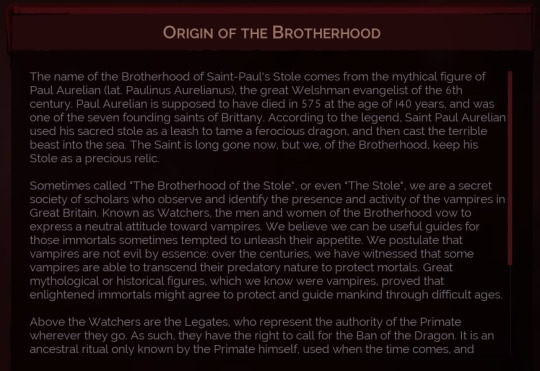
Full screenshot
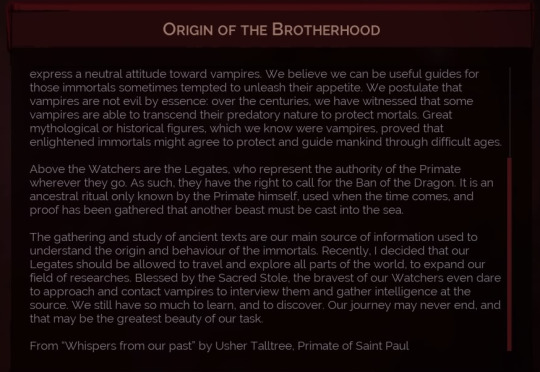
Much of the Brotherhood and Priwen have various allusions to Arthurian legends—from their titles (Priwen being King Arthur’s shield), to the sword that McCullum brings to battle both in Jonathan’s fight and his appearance in Whitechapel cemetery (Excalibur, or Caliburn, was said to be a greatsword of incredible power. The Dragonbane has a similar shape to the said sword, though they are not the exact same models within the game; it was the sword of Pawl, the founder of the original Brotherhood and later on during the Schism, St. Paul’s Stole. The Arthurian legends specific to Vampyr are from the works of Gruffudd ap Arthur (who is more well known as Geoffrey of Monmouth), with his epic chronicle known as “De gestis Britonum or Historia regum Britanniae”, or “The History of the Kings of Great Britain”, from c. 1136)). This is another intriguing thing that will be further analyzed in this section as, while it may have simply been for mechanical game reasons—Edgar has both a copy of the Dragonbane and Carl Eldritch’s original gun—Barker; symbolic weapons to both sides of the Original Brotherhood.
On the assumption that both of these things were not purely stashed into Jonathan’s room for convenience (i.e: said game mechanic purposes), what could this potentially mean in terms of Edgar’s entire, and true connection, that he holds with the Brotherhood? I question this as we first get glimpses of a possible connection between him and Priwen. As you head on to the second arc of the entire game, you eventually run into Geoffrey McCullum and Edgar arguing in his office. Before you enter the room, however, you can overhear several lines between the two of them. Here is all of them (thank you to @zenkhartha for compiling these):
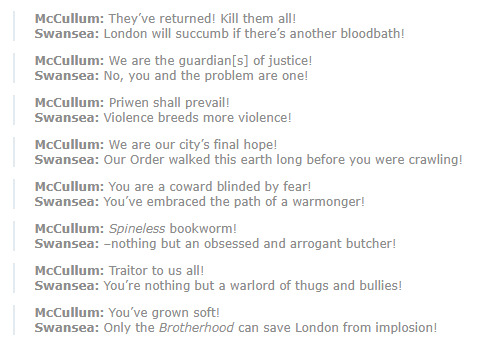
All of these are rather interesting, but the line “You’ve grown soft!” to me, seems to augur that Edgar was not once previously the giddy, neutral scholar that the Brotherhood is suggested to be members with, which would also correlate to Usher’s statement. It also correlates to the idea that the Brotherhood keeps their true, hidden behaviour under more wraps than people may believe. Take Redgrave’s note for the Ascalon Club, warning his members to not be labelled as a “Dragon”:
Full screenshot
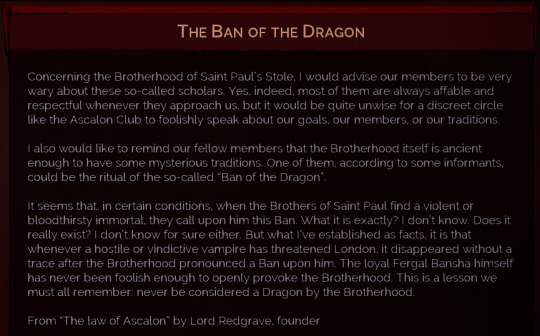
This sort of fear is clearly indicative towards the idea that the Brotherhood, even now, is more than just neutral scholars that seek to understand vampirism on all facets. Adding onto this, why does Geoffrey barge into Edgar’s office anyway? Why does Edgar speaks words that seem to indicate he is quite familiar with the man, or at least has had some prior connection with Priwen, or perhaps just Geoffrey?


When Geoffrey does not yield, Edgar reminds him of the kind of territory Pembroke is in quite the uncannily authoritative manner. A neutral territory between the likes of both the Brotherhood and Priwen.

This suspicion alone becomes even more curious if you choose to have Jonathan Turn both Geoffrey and Edgar. If Pembroke is not hostile, Edgar says some fascinating things regarding his relationship with Geoffrey.
These two following portions remain unchanged, but, Jonathan begins with this:


Prompting Edgar to say this:


Now, if Geoffrey is Turned as I mentioned, Jonathan will be triggered to say this line, bringing up an important aspect to Edgar and Geoffrey’s history:


Edgar simply comments on Geoffrey’s “condition”, questioning his acceptance of it (which is funny, given how Geoffrey seems strangely… fine with his change, but, that is a discussion for another time).


To reel back slightly, here are the two weapons I mentioned that Edgar seems to have stashed in Jonathan’s room. If you purchased the Hunter’s Heirloom DLC, you receive two weapons, both of which have once belonged to a side of the original Brotherhood. Here is Priwen’s weapon:
Full screenshot

Here is the Brotherhood’s, with a Dragon and True Dragonbane comparison showing no difference (which may be due to the implication that the True Dragonbane has had several copies of it made: “It seems a few copies may have been made…” — Funnily, both of them read with the line “but this is the true and original Dragonbane”):
Full screenshot
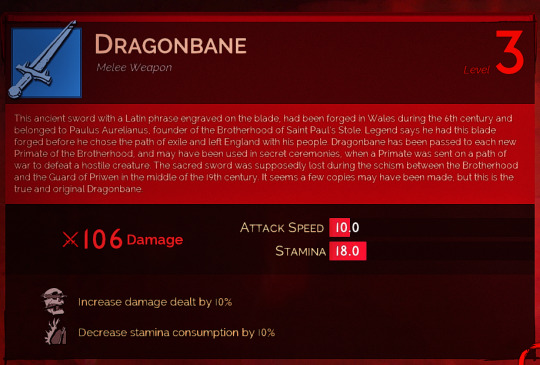
Full screenshot
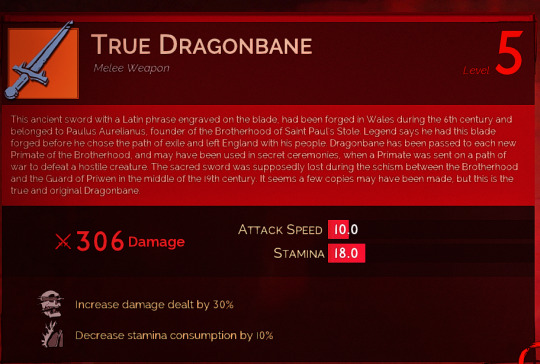
This could implicate a variety of things. Perhaps Edgar knows Geoffrey merely due to the poor relationship between the Stole and Priwen. Maybe Edgar himself had once aligned with Priwen. Perhaps he simply knows McCullum from something else entirely—the curious thing is that no one can really know for sure! However, now that we are armed with the fact he has both weapons, and the fact that the Brotherhood was once merged with Priwen, one must point to the apparent kinds of practices the Brotherhood used to perform. Usher shares quite the sinister insinuation for both the original Brotherhood and perhaps even the current Stole, as we see above.
Usher claims that the Brotherhood is now merely a neutral sector of scholarly individuals simply looking to study vampirism, but to technically define one’s organization as neutral, you must avoid two things—they cannot attack and thus be hostile which is essentially what Priwen are, and, they cannot eagerly fraternize or become friendly with vampire either, which is what Edgar has become, and I believe this eagerness and fraternization both have to do with his personality and his past. There is a specific line that references just how exactly Edgar becomes so enthralled in vampirism—this line can be seen in the second paragraph of his Embrace biography.

“He first encountered a vampire when he was just a boy. There he witnessed the murder of his nanny, yet rather than retreat in fear, he developed a passion and admiration for blood drinkers that led him to the medical profession. After twenty years of research…”
The reaction itself will be analyzed later on in another essay, but I wish to focus on the bolded aspects, i.e: the fact this passion started young, that it stemmed from the murder of his nanny, and that he joined the Stole twenty years after this incident. Edgar, as stated, was born in the Victorian Era—an era brimming with Gothic imagery, aggressive social rules and intense classism. The fact that he had a nanny from a young age and the fact that DONTNOD chose said nanny to be the one closest mention to family suggests one very large thing about his upbringing: that Edgar comes from a relatively wealthy household (the fact he knows what The Ritz is also suggesting that he is at least well-educated, which in these eras, required money to facilitate). The fact he has a middle name, which as stated was only really reserved for the elite, also adds to this suggestion about his family.
To present a bit of background about childcare at this time: the Victorian Era lasted from 1837 - 1901 which means that Edgar would have grown up in said era before the turn of the century even drew itself near. Depending on one’s class, life as a Victorian child was incredibly difficult, even for the wealthy due to strict social regulations for both of the sexes. Many children in high society were more cared for by their servants than their own families—it was a time of nurses, nannies, and governesses taking care of the children; often on a rigid, clockwork structure. Unmarried women took on these roles and ended up becoming more of a mother to these children than the actual mothers themselves, assuring the true mother that her child would be raised on moral and “presentable” beliefs, as well as an ensure a constantly watched eye upon the child.
The Governess; or, the Missing Pencilcase, c. 1875, Barr, Rev. J. T.
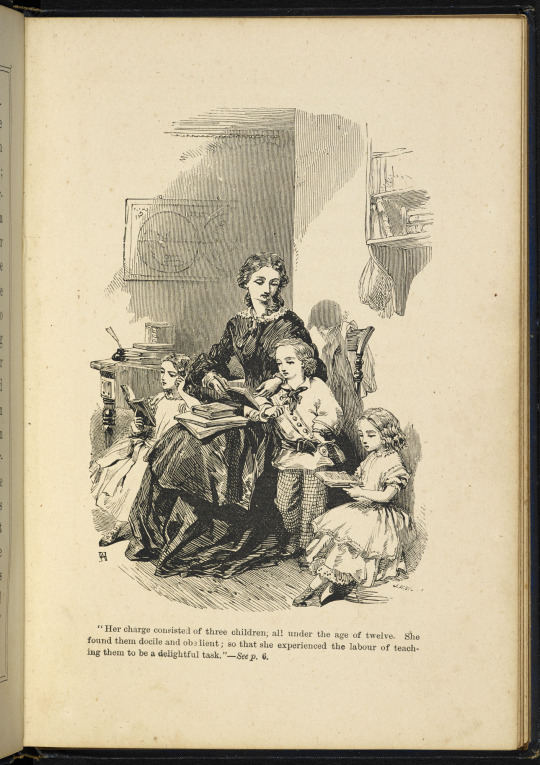
Given how Edgar’s only mentioned caretaker is a nanny, I highly suspect he fell under the watchful care of one for the majority of his childhood. This would explain the peculiarity of one of his hints (the second image is the file name of the datamined hint):


In spite of no biological family being mentioned, that nanny may have been his only motherly figure or even his only consistent caretaker as a child, and thus, someone he would have considered close enough to call family. On the topic of family, is Edgar’s faith. I will simply comment on which faith he would have possibly followed given what we know of his background. I am mentioning his religion given how we have frankly—
Full screenshot

—seen it in action. Continuing on with the theory that he is from Wales but is at the very least, primarily British because he was born in England—Edgar would have most likely been raised a Protestant, as Protestantism has been the most practised religion (other than Anglicanism) in England since roughly 1532, when Henry VII split England from the Roman Catholic Church and paved the way for Protestantism to enter the country. In Edgar’s case, given his theorized background, Protestantism hit Wales when the Tudor Dynasty took hold of the nation throughout the early 1500s and despite some backlash in the region, Protestants are still one of the largest religious groups in the country, though Christianity is rising in both present-day Wales and England.
All of these hints and theories make Edgar a very vague individual, even if some of these things hold a lot of information for what they present. This elusive storytelling is a key component to Vampyr’s narrative structure, as we know so little of the so-called major cast, from Edgar to even our own playable Jonathan himself!
To roughly summarize the whole of his journey to his current place as Administrator of Pembroke Hospital, here is a rough timeline of what we’ve gathered so far:
BACKSTORY TIMELINE:
April 6, 1872: Pembroke’s earliest record in Vampyr. May have been its opening year.
1873: Edgar is born in the middle of the Victorian Era.
1900s: He becomes a member of BoSPS. He mentions being a member for “several years”, right before meeting Ashbury, so the exact date isn’t clear. He is stated to have gone on a “twenty-year journey” before finally obtaining membership, which means roughly some time between the 1880s (he was stated to see the murder as “a boy”) to the early 1900s.
1909: He meets Ashbury (the letter in her estate dates 27 July meaning they’ve met during winter/spring). Strangely enough, this letter mentions her offering him the job at Pembroke, but...
1911: ...This is the official year he takes the role of Administrator, according to Edgar. This means that it took him roughly two years to become the Administrator, for a reason we are unaware of.
A man of many secrets, years of experimentation underneath his white coat, and strained relations between various organizations, Edgar is the epitome of a mad scientist with a history we are unbeknownst to, with even less knowledge as to he has chosen for this path of vampirism, myopia, and experimentation to lead him thus. To mix the sciences with myth, and to seek out this creature that is both man and beast—both immortal yet mortally there, standing before us. Born out of the heart of the Gothic Revival, or the dark Romantics that flooded both literature, politics, and society—his own childhood starting out cold and in tragedy with a vampiric murder.
Rather fitting for Vampyr’s tale, don’t you think?
Credits, Extra Comments, and Sources
CREDITS:
As stated at the top, I want to give much love to @orionali and @terioncalling for helping me with gathering resources and assets of the game to help with my research. Also, all of Orio’s drawings and pieces about Edgar have helped greatly; her dedication to this warm, bubbly, yet somewhat eccentric fellow is what inspired me to finish this in spite of all my real life issues. ♥
I also wish to thank @cursedbethechoice, they have always inspired me to start this kind of analaytical work and l,ove for the game in the first place, and were very helpful in helping me choose my books and sources. Please be sure to check out their work, as they were one of the first to start the lore dissection of the game.
EXTRA COMMENTS:
University absolutely sucks, as this was going to be a full-on character essay dissecting the mad wonders that is Edgar but alas, I could not finish it with the time I was allotted, as I also have a fever as I type this. However! Expect some miniature essays to come out to celebrate Halloween with to go along with this somewhat larger one! I also still intend to analyze Edgar as a character, and hope to publish his dissection around Christmas (but will try to squeeze in other characters/topics on the side).
However, because of all my constraints, I started on Edgar in late August, and just got the time to write and publish something just before the end of October, welp. This essay is 3,695 words long spans roughly about 20 pages, compared to my Vampyr’s Vampires essay which spanned up to nearly 70 pages and was 14,293 words long.
I miss summer already.
I have 50+ books out solely dedicating to analyzing Edgar and some other aspects of Vampyr as a whole. My library hates me.
If anyone tells you about the “Edgar Wall” I made or “The Walls™” for Edgar—Do not speak of it. It’s still up there and will haunt me until Christmas.
I bothered my English professor to contact his linguistic friends to dissect Edgar’s accent once I realized his name is inhumanely Welsh. I had two English Linguists so far just tell me he is “Vaguely European”. If you see memes about that, now you know why. I’m still salty about this and if any Welsh specialists are out there reading this, please, for the love of God, contact me (I also contacted Vampyr’s Voice Director, but with no luck... yet. I’m this close to bothering Harry Hadden-Paton himself).
Edgar is cute. Ansel proves it.

ALL SOURCES/BIBLIOGRAPHY (in no particular order):
The National Library of Wales’ WELSH HISTORY REVIEW/Cylchgrawn hanes Cymru “Notes on the Heirs of Commodus” - The American Journal of Philology, Vol. 100, No. 2 (Summer, 1979), pp. 288-306, The Johns Hopkins University Press Edward Champlin TIME Magazine’s “Now You Know: Why Do We Have Middle Names?” THE OLD NORSE CONTRIBUTIONS TO THE DEVELOPMENT OF THE ENGLISH LEXIS–A STUDY BASED UPON PROTO-GERMANICKATARZYNA MONTICOLO University of Wrocław, 2016 JSTOR’S Open Academic Resources The etymology of “Edgar” in Wikitionary The etymology of “Swansea” in Wikitionary The etymology of “Griffith” in Wikitionary Forbidden Knowledge: From Prometheus to Pornography, Roger Shattuck, 1997 Merriam-Webster’s Online Dicitionary “Raising Children in the Victorian Times“—School Work Helper Greenleaf, Barbara Kaye. Children Through The Ages. New York: McGraw-Hill, 1978, pp. 78-83. British Library’s “The figure of the governess”, Kathryn Hughes, 2014 British Library’s video of “The governess” as explained by Kathryn Hughes, 2014 BBC’s Wales’ History: “The Protestant Reformation (part 3)”, 2014 A NOTE ON GRUFFYDD AP LLYWELYN: (1039-63), Walker, David. Welsh History Review = Cylchgrawn Hanes Cymru; Cardiff Vol. 1, Iss. 1, (Jan 1, 1960): 83. Genuki - UK & Irish Genealolgy: “Place names in Glamorgan“, 5 Sept 2013 - Gareth Hicks Rensselaer Polytechnic Institute’s (RPI) “Edgar (The Peaceful) King of England”, 25 Jun 2003 “The Liber landavensis, Llyfr Teilo, or, The ancient register of the cathedral church of Llandaff”; from mss. in the libraries of Hengwrt, and of Jesus college, Oxford (Specific Page) England’s Royal College of Physciains’ Homepage A BRIEF HISTORY OF SWANSEA, WALES, By Tim Lambert The Welsh Academy Encyclopaedia of Wales, John Davies Nigel Jenkins Menna Baines, Feb 2008, University of Wales Press BBC Wales’ “Swansea: The ugly, lovely town that became a city”, Phil Carradice, 03 July 2014 BBC Wales’ History: “The investiture of the Prince of Wales” Chisholm, Hugh, ed. (1911). "Swansea". Encyclopædia Britannica. 26 (11th ed.). Cambridge University Press. p. 183. Genuki - UK & Irish Genealolgy’s Swansea Timeline Geoffrey of Monmouth—HISTORY OF THE KINGS OF BRITAIN, translation by Aaron Thompson, revisions by J.A. Giles, (pg 153), 1999
#vampyr#edgar swansea#vampyr game#essay#dontnod#mine#this is smaller than my last one but alas#university sucks#and i got sick#but!! expect a deeper character analysis and more smaller pieces to be posted throughout this week for halloween#happy trails#HE IS NOT JUST VAGUELY EUROPEAN#I REFUSE TO BELIEVE THAT
45 notes
·
View notes